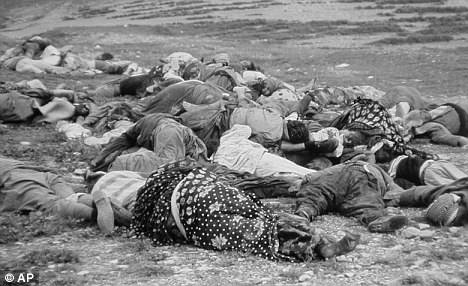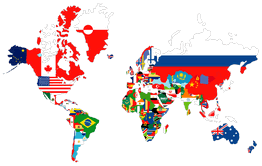First, I would like to thank Steve Davison for his generous donation. Although I’m not in the States right now due to a family emergency, but the mission is still the same and the rest of the directors are taking care of everything. I received a rather historical question on Iran’s relation with foreign countries from an interested blog reader. I’m no expert, but here’s my humble attempt to shed more light on Iran’s history so the American readers can understand where the hyped-up media reports come from. This was written to give an insight, however small to the recent history of Iran with the hope of better explaining the background of its people. It is not an accusation nor is it a defense of any government.
Iran was known as Persia until its name was officially changed to Iran in 1935. Iran is not an Arab country. In fact, it is an insult to call Iranians Arab. Iran was invaded by the Arabs in 644 A.C. The religion before the conquest was Zoroastrianism and is still practiced in Iran. Contrary to the claims of apologists, Iranians in fact, fought long and hard against the invading Arabs. Once politically conquered, the Persians began to resist the Arabs culturally and succeeded in forcing their own ways on the Arabs, and it’s not a coincidence that Iran holds the largest Muslim Shi’a denomination which is a minority in Muslim world. The Arab states (Sunnis) have never been an ally to Iran with the odd exception of Syria and have gone to great lengths to even name the Iranian territories by Arabic names and the biggest abomination of all, calling the Persian Gulf the Arabian Gulf.
“It’s all England’s fault,” goes the semi-humorous saying that has been repeated in Iran for centuries. Russia, England and the United States have been always controversial in Iran. Great Britain is traditionally blamed for all the troubles in Iran with the United States considered the “Great Satan.” Russia is hated for the confiscation of two provinces in Northern Iran in 1813, due to incompetency of one particular Persian king, Fath Ali Shah. The invading Russian armies occupied the Aral coast in 1849, Tashkent in 1864, Bukhara in 1867, Samarkand in 1868, and Khiva and Amudarya in 1873. The Treaty of Akhal, in which the Iranians were forced to cede Khwarazm, topped off Persian losses to the global emerging power of Imperial Russia. That’s enough loss to make any Iranian have a second thought when it comes to deal with anything Russian.
England has a long history of colonialism as we already know, and when it came down to rich Persia, they were ecstatic about what they could get out of it. Before 1800, the Brits had no substantial influence as the Persian kings were particularly strong and oil was not their priority. However, after the 18th century, most of the Persian kings started their leisure excursions to the European countries and were mesmerized by the way of life abroad, which paved the way for the British government to hack its way through Persia. In fact, Iran’s current southern and eastern boundaries were determined by none other than the British during the Anglo-Persian War from1856 to 1857.
In 1941, in midst of the Second World War, Russia and Great Brittan yet again, ignored the Iranian neutrality plea and invaded Iran forcing the king, Reza Pahlavi, to leave the country in exile and shifting the power to his son, Mohammad Reza Pahlavi, the last king of Iran. At the end of World War II, there came a new rival to the traditional two-pole foreign influence of Russia and England. This time the United States moved in to convert Iran to an anti-communist state in the rage of the Cold War, and that ended the long-lived Russian influence in Iran, but the Brits stayed close on the scene.
In 1951, Dr. Mohammad Mosaddegh, Iran’s prime minister, started a movement which led to the nationalization of the oil and gas industry and by that, cutting the hands of the Brits off the liquid gold. What the Brits paid the Iranians for oil before the nationalization was nothing but highway robbery, and they were not happy to see it go. The United States also saw its interests in danger and shook hands with Great Britain to bring down the prime minister. In November and December of 1952, British intelligence officials suggested to American intelligence that the prime minister should be ousted. On April 4, 1953 the CIA director, Allen Dulles, approved $1 million to be used “in any way that would bring about the fall of Mosaddegh.” Mosaddegh became aware of the coup and dissolved the parliament. The CIA plan, however, was carried out to insure the United States’ and Great Britain’s cheap access to the Iranian oil. On August 19, 1953 the planned coup came to a successful end and by that, the only democratic government Iran has ever seen came to an end. Mosaddegh was imprisoned for 3 years and spent the rest of his life under house arrest until his death in 1967. Yet again, the coup confirmed the lifelong suspicion of the Iranian people that nothing good ever comes out of foreign relations.
In the winter of 1979, after a decade of uprising, the Iranian revolution finally became a reality and with that came the end of 2,500 years of monarchy in Persia. Shortly after, the Islamic Republic of Iran was formed under the supervision of the Supreme Leader, Ayatollah Khomeini, and little by little, the secular west-praising Iran shifted to a Muslim state which scared the hell out of the neighboring Arab countries as well as the Western powers.
The Arabs were concerned because they didn’t want Iran to export its Shi’a revolution to their Sunni-run countries, and the West was concerned for the seemingly over-the-top fundamentalist leaders of the new republic. This concern was heightened when Iran invaded the US embassy in Tehran and took 53 diplomats hostage for 444 days during the Carter Administration which ended on January 20, 1981, twenty minutes after Ronald Reagan was sworn in as the new president.
On September 22, 1980, with the backing of the Arabian states, the demented leader of Iraq, Saddam Hussein, decided to take advantage of the revolution’s chaos in Iran by invading the Iranian soil from Northwest to South on the old claim of border disputes, thus beginning the Iran-Iraq War. Iraqi armies advanced full throttle for the central and the oil-rich south, killing and destroying what they could on their way. By March 1980, the invasion came to a stall, and Iraq’s army did not advance another mile from what they had already taken and that included the city of Khoramshahr in Khuzestan province. Nothing major happened in the following year, but in March 1982, Iran took on the offensive and inch by inch, the Iranian military took back all of the occupied territories by July 1, 1982.
In 1982 the Arabian states came together and offered the total reconstruction of damages by compensating Iran to end the war. Iran denied the offer, and the war raged for another six long years as the Iranian government made it its mission to advance until the occupation of Baghdad and put an end to Saddam’s regime.
The United States along with other European and Arab countries contributed greatly in weapons and economic aid to Iraq during the war. The Soviet Union, perhaps, was the number one supplier of weaponry and military advisors to Iraq during the war to the extent that, at the end of the war Iraq owed the Soviet Union almost $10 billion in military debts alone. The Soviet Union also sold weapons and ammunitions to Iran, completing its race for the weapon sale and destruction. France was the second greatest supplier to Iraq and tended to supply higher-technology equipment than the Soviets. This does not mean that many other nations did not either provide materials or encourage client states to do so, or that there was not a brisk business by private arms traders.
The Reagan and Bush Administrations sold over $200 million in weaponry to Iraq with billions of dollars in loans, including The Iraq-Gate Scandal which an Atlanta branch of Italy’s largest bank, Banca Nazionale del Lavoro, relying largely on U.S. taxpayer-guaranteed loans, funneled $5 billion to Iraq from 1985 to 1989. Not only did Reagan’s administration turn a blind-eye to Saddam’s regime’s repeated use of chemical weapons against Iranian soldiers and Iraq’s Kurdish minority, but the US helped Iraq develop its chemical, biological and nuclear weapons programs. With more than 100,000 Iranian victims of chemical weapons during the eight-year war, Iran is one of the countries most severely affected by Weapons of Mass Destruction, yet it’s being accused of producing such weapons by those who actually made them. At the time, the UN Security Council issued statements that “chemical weapons had been used in the war” and again, the United States and Great Britain remained shamefully silent.

Iran also obtained weapons and parts for its monarchy-era U.S. weapons through underground arms dealings from officials in the Reagan Administration. It was hoped that Iran would persuade several radical groups to release Western hostages, though this did not result; proceeds from the sales were diverted to the Nicaraguan Contras in what became known as the Iran-Contra Affair.
At the end of the war in 1988, the USS Vincennes, an American gunship, shot down an Iranian airliner flying from Shiraz to Dubai claiming that they “mistook” the giant Jumbo-Jet for an F-14 Tomcat Jet-fighter. Tragically all 290 innocent civilian passengers, including 66 children perished over the Persian Gulf. At the time of the attack, The USS Vincennes was indeed inside Iranian territorial waters, and the Iranian airliner was within Iranian airspace.
Was the crew court-martialed? No. They got decorated. After completing their tour, the Vincennes crew was awarded Combat Action Ribbons for having actively participated in ground or surface combat and the captain William C. Rogers received the Legion of Merit which is a medal that is awarded for “exceptionally meritorious conduct in the performance of outstanding services and achievements.” Finally In 1996 the United States agreed to pay $61.8 million in compensation for the Iranians killed, however, the United States did not admit responsibility or apologize for the killings.
After 8 years, Iran and Iraq finally signed the UN Security Council Resolution 598, and on August 20, 1988, peace was restored. The war between Iran and Iraq left Iran with over 700,000 deaths, more than $500 billion in economic loss and thousands of families mourning, including mine. I grew up in that war.



Thanks for the updates, I worked with a guy from Iran in the past… he was visiting family when 9/11 happened and needless to say took him months to get back here to work.
I often see other countries take a view on Americans as individuals based on what our Government does, and often think Americans as individuals do not understand what the Goverment does on our behalf. Needless to say it is best to keep politics seperate from trying to help the people in need, but doesnt hurt to try to understand things from their point of view and show them how we are all just people and not focused on the same agenda’s our particular Goverments are.
A good way to do this is through this very project and the number of Americans helping out and donating will prove to various countries that do not understand Americans as individuals that do care and are trying to help them.
Wow, you know your history!!
Don and I were wondering if you were going to take part in the protests… never to be seen again…
If anyone was to be courts-martialed for shooting down the airliner it would just have been the Commanding Officer and possibly the Weps boss and intelligence types aboard the ship, not the whole crew. The crew was doing what the crew is supposed to do, following orders from their superiors. That may sound like a cop-out, but unless you can prove beyond a reasonable doubt in a courts martial hearing that the order that was not obeyed was not legal or given frivolously, the orders must be followed. That’s the way the military operates.
The ship that’s ablaze in the photo there, whose navy does it belong to? That’s not an airliner.
A whole lot of history is like that: whitewashed by the powers that be.
I remember that when I was in college (in Utah) I used to play chess every day with another student who’s father was an officer in the Shah’s air force. My father was in the US air force and so we had a lot in common just because of that.
He had a rather rough time of it in school, because it was very popular in the US, at that time, to distrust people from the middle east.
Nowadays, in spite of our tendancy toward more liberalism, it has gotten even more so. The real causes are not evident to the average person here. We are being led into this culture clash by huge economic powers which ignore the soverignty of nations, and promote wars and hatred for their own purposes.
Though Americans might be involved heavily in thse matters, to call these powers American or British or with the name of any particular nation is very misleading.
They are globalist or multinational forces, and they virtually scorn the rights of soverign nations at will.
Chris, my condolences to you and your family. I know you’ve been stuck in limbo waiting for clearance on your tax exempt status and now a personal tragedy, but the world isn’t going anywhere and your cause will still be there when you’re finally able to press on.
Brad bk
It will be about that again soon, the IRS and an unfortunate sickness in his family has changed that for now. I think the reasoning for his post was to explain things from his view, we dont have to agree or even understand it all to want to continue supporting the mission at hand.
I hope everything goes well for him in Iran and he gets back to the cause soon.
I wont be riding my GS, but will be walking to combat local hunger in Massachusetts. Everyone can try to do their part in their own communities as well as trying to help globably. I need to personalize the page and get my team together, but if anyone is interested in watching my progress you can check it out here: https://www.projectbread.org/goto/thewalkers
Take care and God Bless
Don’t you just hate it when life gets in the way of your goals…
Very interesting read Chris, thanks for the history lesson. I have a friend from France who did a rtw trip in 2008 and spent a week traveling through Iran and had a great experience with the people and the culture. It is shame what governments create in this world.
https://www.youtube.com/watch?v=Sdd-1DXfxCM